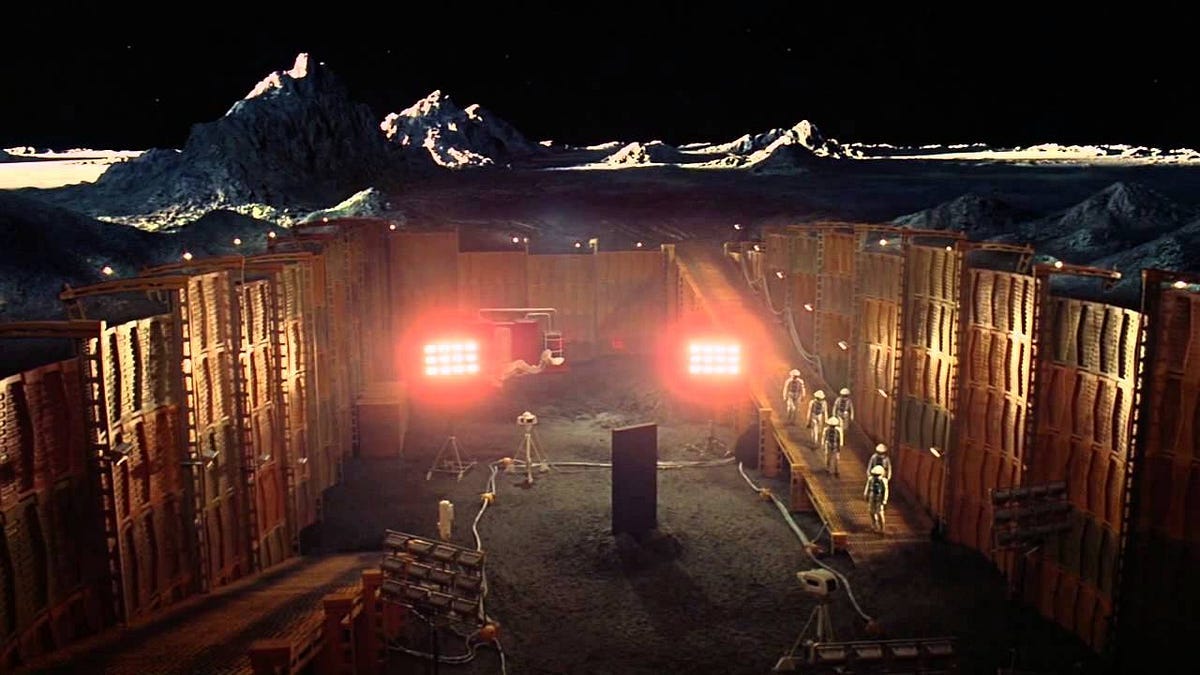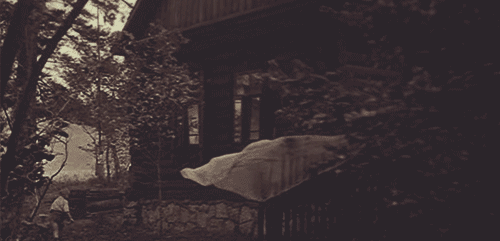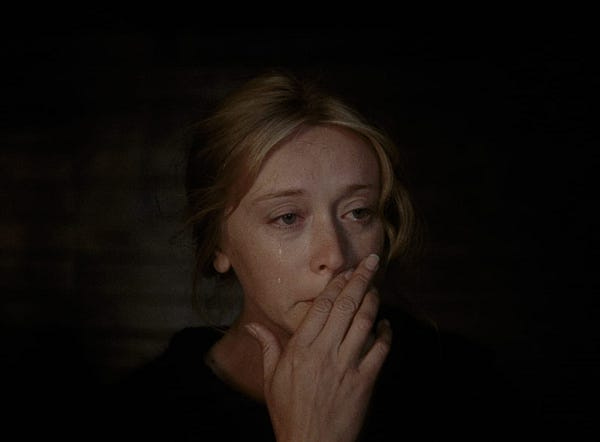A Morrowlithic Revolution
Technoscientific incrementalism will not fuel the escape velocity from the gravity of modernity we so desperately need. What might?

🎼 Requiem: II Kyrie by György Ligeti
It’s been said more than enough times already: We’re in a metacrisis. Or a polycrisis. Or a permacrisis. Perhaps even a hysteria of crises; of which word best encapsulates the Crisis of Our Times (of All Times?). Simultaneously, if your own local variant of civilisation has already been ground through the apocalyptic annihilation mill, a crisis of what exactly? A crisis of willful ignorance and slothful delay between cause and effect perhaps. A crisis of arrogance and vanity that this monolithic ‘Empirocene’ would be any more successful than those which came before it.
Meanwhile, as we flex our muscles in debate, taut with anxiety and endless bickering over the supremacy of which expression best articulates the shape of the wicked complexity we’re all facing into; meanwhile, as we exchange furiously passive-aggressive extracts of Rilke poetry and intellectually rigorous and quantified True Facts of the ecological and ecosystemic magnitude of It All; meanwhile, and often discretely murmured as a deafeningly inaudible background whisper of white noise, the only planet in the known universe that we know with absolutely certainty to support and sustain a rich and overwhelming abundance of complex life sadomasochistically burns, melts and drowns itself into premature oblivion, under our exemplary stewardship. Surely worthy of a round of applause for our collective insanity as a species.
Meanwhile, The Civilisation goes on. Well enough to sustain itself for just another day, one day at a time. The Civilisation in which, no matter what corner of the globe, what proximity to its core, whatever your stance on or rejection of, is nonetheless an unavoidable part of you, and you a part of its relentless march towards extinction. Business-as-usual tries so desperately to cling to the increasingly unusual business of double-digit percentage growth, union resistance, remote meetings, regional devolution, territorial occupation, workplace benefits, hydrocarbon extraction, innovation hackathons, mineral acquisition, staff retention, annual leave, technology acceleration, wage stagnancy, financial profit, biodiversity loss. An eclectic mix of numbing anaesthetics and targeted, mission-accomplished avoidance.
The Scottish government recently ditched its flagship target of reducing greenhouse gas emissions by 75% by 2030. Given the relative exploits of the USA, China, India & Russia, even Scotland’s historical, let alone its contemporary, contribution is barely a drop in the ocean. But given where we collectively find ourselves, their retreat serves as a prime example of the disproportionate dilution of what our situation requires. As the final coal-fired power stations closed yet targets continued to be missed, one journalist mused that “politicians conceded that the low-hanging fruit had all been picked and any future progress would require big changes to how we live our lives.” It seems the answer, in the face of admirable ambition, is to ditch the targets, rather than attempt the transformative change. Meanwhile, the metaphor collapses under the weight of its own oxymoronic dissonance: decarbonising our diseased tree of life bears no relation to picking fruit, convenient or otherwise. If only there were even any apples left on the sterile branches of a once-healthy and thriving orchard. I’d suggest Scotland’s situation is more akin to throwing out the bathwater, before even bathing the baby. And they’re far from alone.
I doubt anyone alive today ever fully believes the mainstream story of progress. Or never feels even a momentary twinge that something isn’t quite right about our present moment, and its most obvious direction of travel. But, even knowing what we all know, the alternative story of abundant prosperity for all, in balance with living systems, shared with multispecies beings, in models of pluri-clusive economic fulfilment isn’t quite landing either. Too fanciful or fictitious? Too much effort?
Although intuitive story trumps rational data every time, perhaps the stories we’re telling don’t have the desired effect because of their distance from the reality of daily existence, where most of us are too busy to stare beyond the next paycheck, or too distracted by the strenuous 24–7 over-exertion of hitting profit targets ahead of the next quarterly earnings call, or variations thereof. The dream alternative sounds nice enough, but it remains just that: a dream. Never mind the gap, it's an unbridgeable chasm, likely exacerbated by the need for such visions to conform to the grammar and rhetoric of the mundane: slide decks, talks & workshops, and highly curated safe spaces for those things tagged as ‘art’.
So crying out in frustration for external intervention from a higher power becomes an impotent get-out clause as to why our most progressive fantasies don’t become realities, and yet, demanding transformation to happen somewhere else, by someone else, is probably not entirely delusional either. Influential change of the highest order clearly needs to happen for our influential brood of biased/bigoted bigwigs’ bulbs to light up, or their pennies (and balls) to drop. But as I’ve written about previously, the inception of change more often needs to come from within — for a self-authored conceptual realisation that a reorientation of reality is not just in order, but much overdue. Sieging the already well-defended fort of incumbent Civilisational norms (i.e. financial accumulation, regional disparity or subservience, convenient oppositional ideological binaries) with hostile counter-arguments tends to simply reinforce established positions, and their fallacious sunk-costs, against future attacks.
Although enlightenment in others can be encouraged through subtle gestures towards self-realisation, there’s also a big difference in nudging incremental change of a modest scope — one that might be applicable to check a dominance-driven leadership style, or culturally-realign an organisational dysfunction — versus the macro scale required to run the tanker of nihilistic consumerism aground, without spilling its malignant load ashore in a cascade of existential disaster for the guilty and the innocent alike. Such a magnitude of enduring transformation demands a more profound and persistent transcendence.
Transcending the profane
Transcendent experiences jolt us out of our day-to-day mundanity to challenge the very notion and condition of what it is to be human. But the triggers that alter, elevate, or expand our states of consciousness to point us in this direction may not be as scarce as we might otherwise typically tend to believe. Whether through the voluntary indulgence of physical exertion or relaxation, the immersive curiosity for mental or sensory (re)attunement, or the darker encounters with extreme trauma, there is a spectrum on which lies everything from yoga, meditation and daydreaming to mystical/religious experiences, psychedelic therapy, and life-changing accidents or near-death events. To draw a moral line through this in order to divide valid from invalid, rational from irrational, or sensible from foolish would be arbitrary and perverse. Many perspective-shifting techniques exist that enable us to temporarily reshape, or entirely rewire, our perceptions of reality, and no universal rulebook determines what works for whom. Spontaneity and serendipity seem to be consistent attributes, as much as (or even more so than) deliberative strategic planning for a dramatic self-selected hijacking.
Take Douglas Harding. In his early life, Harding was an architect with a passing interest in philosophy. A series of unrelated events, including the discovery of a self-portrait by Ernst Mach, a walk in the Himalayas, and the theories of relativity that were filtering into philosophy at the time, all coincided towards a revelation that he was made of layers which, depending from what distance observed, could encompass just the atoms in his eye, or the molecules in his head, or by zooming further out, his local community, regional society, planetary civilisation, or indeed the entire galaxy. From his perspective, at a distance of zero metres from himself, he was “looking not out of two eyes but a ‘single eye’, a boundless openness — an openness that was self-evidently aware, and was also full of the whole world.” He had no head* — an observation both “charmingly childish and solipsistic” (Hofstadter, 1981) yet undeniably and demonstrably true through readily replicable first-hand experience — thus allowing him to “glimpse the non-duality of consciousness” (Harris, 2014), and connect intuitively to the Buddhist doctrine of anattā, or ‘non-self’, via this very tangible, accessible and unpretentious lived experience, beyond the exclusivity, focus and often esoteric practices of Zen.
The aesthetics of enigma
We don’t have to be Douglas Harding, or follow the Headless Way, to transcend mundaneity. Most people can identify with an experience they’ve had that was inexplicably affecting. It usually occurs as something embodied, demanding the attention of multiple senses, and feels intuitively transmissive of meaning, yet difficult to put easily or retrospectively (or at all) into words. Making sense of what at first glance appears to be nonsensical. Feeling as if you’ve glimpsed access to a realm of awareness that wasn’t fully intended to be understood in a way in which vocabulary or even science was ever conceived to make sense of. Deliberately esoteric to any and every intellect, rather than translatable solely by an elite. A truer reality; more real than real; the filters off. These words barely skim the surface of the deeper tactility of those experiences. You just nod your head, “not do it justice”, “get what I mean” and “have to be there” as verbal approximations of the utterly ineffable.
“Meanings are encumbered by words.” — Fang Yizhi
Yet acknowledging an ‘awakening’ spectrum for such quantum change, from the barely perceptible through the hyperreal to the forcefully visionary, is also important. There is no divine exclusivity to such hyperconscious ‘enlightenment’, or any prescription of what you can expect to be revealed when you get there. It can be triggered by a sunset, nostalgia, a nap in the garden, a walk in the hills or the birth of a child. Nobody needs to fast for 40 days in the desert to get to some form of realisation (though it probably helps), and it doesn’t have to conclude at a Buddhist monastery or messiah complex (and probably best it doesn’t). While there tends to be a correlation between lack of control and the intensity of insight, we all dip our toe in the water consciously or subliminally to various degrees, even when we listen to music or watch a film.
“If you look for meaning, you’ll miss everything that happens.” — Andrei Tarkovsky
As an art student, the Tarkovsky film Mirror (1975) left just such a modest but powerful impression on me in ways that aren’t easy to explain. When you look into the plot synopsis, of a dying man remembering his past, it will tell you absolutely nothing about the one hour and forty-seven minutes you spend in its company. Though impossible to guarantee the same experience is replicable for everyone, watch the first 15 minutes and you’ll at least have some clues. Its long continuous tracking scenes don’t feel constrained by a continuous chronology in time. It’s lyrical not logical, delivering comprehension untethered by coherence. A richly aesthetic ‘story’ to be felt as a transcendent nudge, rather than dissected by rational logistics. As one fan notes, you don’t really have to ‘understand’ Mirror to understand Mirror.
It’s worth noting that the word aesthetics originally meant ‘perception by the senses’, from the Greek aisthētikos (from aisthēta ‘perceptible things’ and aisthesthai ‘perceive’). The modern definition, which now limits its scope solely to a concern for subjective beauty, was only adopted into English relatively recently, hinting at the atrophy and dulling of civilisational sensitivities implied by elevating the quantifiable over the perceptual.
In Kubrick’s 2001: A Space Odyssey, an avant-garde yet mainstream sci-fi movie whose experiential immersion remains all the more impressive given its age, humankind takes its intellectual leaps of exponential advancement through the briefest tangible interaction with an artefact of mysterious origin, a celestially perfect objet d’art. No explicit clues are given as to how or why this is so, and Kubrick’s film stands as a proud testament to the power of ineffable transmission of profound meaning, working on parallel plains of perception that coexist simultaneously — both in the internal workings of the existential narrative itself, and from the observer's external vantage point watching the film. i.e. You’re watching humankind have a profound experience, while having a profound experience yourself.
Now humankind needs to find a way to replicate the same effect. For our most valuable actors, who act as our most effective leverage points for change, to ‘touch the monolith’, as it were, without relying on the outsourced coincidence of extraterrestrial intervention. Our cosmologically humbling kick up the arse is not going to come from the stars above, nor from staring down into the virtual abyss, hypnotically transfixed by our handheld black mirrors. But from the perspective-shifting qualities of art, psychedelics, and trauma, in no particular order. We still, barely, have a choice of which.

Footnote: For more on Douglas Harding and the Headless Way, I recommend listening to the Making Sense podcast episode 🎙️The Illusory Self — a conversation between Sam Harris and Richard Lang (from 16m onwards)





